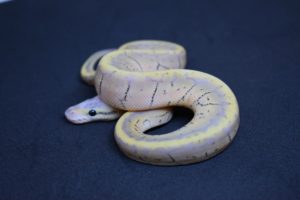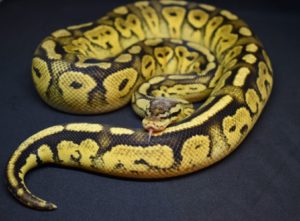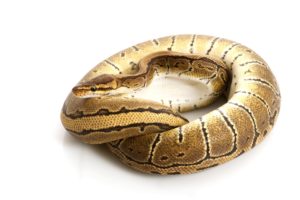Can Ball Pythons drink tap water? They can, but there are healthier options. Let’s take a look at what types of water are best.
Wherever tap water is safe for humans, Ball Pythons can drink it. It won’t do them immediate harm. Nonetheless, it isn’t the healthiest option for them, either. In fact, tap water generally contains small amounts of fluoride and chlorine or chloramine. Better options include flat, bottled water and filtered water.
How often do Ball Pythons drink?
Ball Pythons drink water on a regular basis and seem to appreciate being given fresh water and a clean bowl every few days. Some will even drift over to it and drink straight away.
In general, my adult Ball Pythons drink around once a week. Hatchling Ball Pythons will drink slightly more often, usually every few days. Occasionally, some hatchlings don’t drink on their own – they just don’t seem to get it!
For these little ones, I put their snout into a fresh bowl of water every few days and coax them into drinking until they know to go looking for the bowl themselves. It is very important that Ball Pythons always have clean water available, and that you make sure babies are drinking regularly.
How do you know if a snake is dehydrated?
When snakes are dehydrated, they show a range of symptoms. Tough species like Ball Pythons don’t just drop dead from it; their appearance and behaviour will change over a period of weeks.
This is because snakes have incredibly efficient kidneys, and a slow metabolism. They simply hang on to water better. They also pass uric acid, rather than urea, and this substance draws less water out of their body. These factors combine to make slight dehydration hard to spot in reptiles, and by the time you notice something’s up, it’s usually quite serious.
In general, snakes that are dehydrated show dull mentation (get very slow) and develop folds of skin along their flanks. If left too long, they begin to take on an anorexic look. Their eyes sink into the skull, and they start to look skeletal. This is in great part due to their body extracting water from its subcutaneous tissues.
If your snake begins to show any of these symptoms, the best solution is to give it a supervised bath in water that is safe for it drink. A lot of resources now say to use an electrolyte solution to rehydrate a snake – and this can work. If symptoms are so severe that the eyes appear sunken, however, I recommend heading straight to a vet.

It’s important to remember that hatchlings will dehydrate faster than adults.
Is tap water safe for snakes?
In most places around the world tap water is safe for snakes if it is safe for people. It sounds very simple but it’s true: if your tap water isn’t safe for you, it’s because it contains germs, parasites, or chemicals.
If, however, you drink your tap water regularly, it will be ok for your snake. Nonetheless, it doesn’t mean that it’s necessarily good for your snake. A reptile should drink water that has the least number of contaminants possible (as should we, really!). A lot of tap water contains fluoride and chlorine or chloramine, all of which are technically poisons. Chlorine in particular is an irritant to most animals. Tap water may be safe, but it’s not the best.
Do Ball Pythons need filtered water?
In all honesty, most household water filters (the kind with a pitcher) do a pretty good job. Inside the filter there is generally some kind of active carbon that sucks up chlorine and heavy metals, effectively removing them from the water.
This would make it seem like a great idea for your pet… And don’t get me wrong: when the filter is very fresh it does make tap water safer for Ball Pythons. The problem is that it doesn’t remove germs, and that the filters are a great place for them to grow!
By using filtered water for your Ball Python, you could be exposing it to a large cohort of bacteria, unless you change the filter very regularly. All in all, I’d say it’s not the best option, but still better than regular tap water. You can read more about filtered water here.
Does boiling water make it reptile safe?
Boiling water does not necessarily make it reptile safe. In theory, it should… And it does in fact get chlorine out quite quickly – but not necessarily heavy metals. These cannot be removed by boiling alone!
In this scenario, filtered water is a better bet. As we’ve just discussed, however, it’s still not the best option.

What water is safe for reptiles?
So what water is safe? My verdict on this one may divide opinion, but it is as follows: the only water that is 100% safe and healthy for reptiles is still bottled water. It can be bought at your local grocery store and is heavy metal, chemical and germ free. Notwithstanding, always check the label to make sure nothing has been added, like sodium for example.
The annoying part is that it gets expensive to buy bottled water for a lot of reptiles! Personally, I think the best option is to buy bottled for their drinking water, but to just use tap water for bathing them if necessary.
If you don’t want to buy bottled water, I would say that filtered comes in at a close second in terms of safety.
Can you use a fish water conditioner for reptiles?
Conditioner products work by using sulfonates and/or a type of sodium to neutralise chlorine and chloramine. Some brands of fish water conditioners can be used for reptiles, but only if they specifically say so on the label.
Don’t use a water conditioner that is not labelled for reptiles!
Is Stress Coat safe for reptiles?
Stress Coat is a great product… for fish. It helps neutralise chemicals in tap water, and aids fish in repairing any injuries they have. In fact, it’s a pretty amazing product. It can remove both chlorine and chloramine from tap water, and at the same time generates a synthetic slime layer on the fish which gives them time to regenerate their own if they are a bit under the weather.
Stress Coat is not safe for reptiles, however. The manufacturers make no such claim. It is specifically for fish and could make your reptile ill if it drinks it. For reptiles that spend a lot of time in the water, there are specially designed water conditioners available.

Can Ball Pythons drink distilled water?
When you read about distilled water, you might think it sounds very clean, safe even. Heck, it’s 100% pure. What could be better than water with everything else removed? Well, you might be surprised to hear that distilled water is extremely bad for reptiles. Ball Pythons cannot drink distilled water on a regular basis without ill effects.
It’s quite simple why, really, and it’s all to do with how water behaves. Water is negatively charged, that’s why it’s a great solvent. This negative charge makes it pull minerals and dirt out of anything it comes into contact with, kind of like a magnet.
Regular tap water and bottled water still has minerals in it, so it doesn’t have room to suck up much more… Distilled water, on the other hand, has none, so it grabs any mineral content it encounters.
In an animal’s body, this translates to pulling calcium, potassium, phosphorous and magnesium out of the surrounding tissues and even the skeleton. For a Ball Python, this is bad news. They don’t eat every day like mammals: they need to hang on to their minerals!
How to clean your snake’s water bowl
Now that we’ve covered whether Ball Pythons can drink tap water or not, I wanted to add a quick note on hygiene.
One thing all biologists will tell you is that germs love water. Bacteria and Protozoa in particular multiply extremely well in warm water, which is precisely what your snake has in its water bowl!
To prevent your snake’s bowl from becoming a disease cocktail, clean it out at least twice a week with dish soap or a veterinary antiseptic.
In addition to this, I recommend two additional measures. First, choose a bowl with a smooth inner surface. It doesn’t matter what the exterior looks like, naturalistic, or not. It just needs to be smooth on the inside to make it harder for germs to stick. Generally, ceramic bowls have the smoothest, and therefore most hygienic inner surfaces. Plastic and resin can be great too but tend to scuff and get rougher over time.
Second, make sure you are removing biofilm when you clean your snake’s water bowl. Biofilm is a build-up of bacteria, germs and algae that forms in dirty water. If biofilm is present, it feels like slime on the inner surface of the water bowl. Every time you clean the water bowl, wipe around it with a sponge, until it feels clean to the touch. You will notice that clean ceramic bowls make a nice scrunching sound when you run your fingers over them.
Also on this topic:
For more on water and humidity in general:
Back to the water topic page
